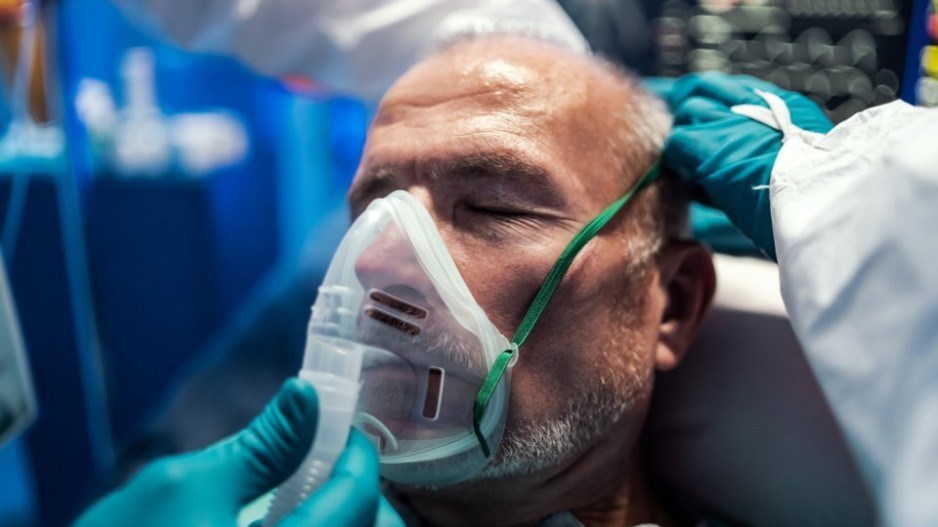A rise in new COVID-19 infections in B.C. raises the spectre that serious illnesses will increase in the weeks ahead.
Health officials detected 832 new infections in the past 24 hours – the highest daily total since August 27, when there were 867 new cases recorded.
Testing was also very high in the past day, with 17,965 tests conducted. The exact number of new COVID-19 infections in B.C. may have even been higher than 832 in the past day, as that number was said in a government statement to be provisional. The province's COVID-19 dashboard then late afternoon on September 23 said that the province recorded 861 new cases in the past day.
If the real number of new cases was 832, that raises the province's total number of known infections, since January, 2020, to 181,769.
More than 95.6%, or 173,786 of those, are deemed by the province to have recovered because they have gone 10 days after first feeling symptoms, and are therefore not thought to be infectious.
Significant numbers of COVID-19 patients continue to clog B.C. hospitals' intensive care units (ICUs), as the province's fourth wave of the pandemic shows no sign of petering out.
Of the province's 510 ICU beds, and more than 230 so-called "surge" beds, which were added during the pandemic for emergencies, 148 are filled with COVID-19 patients who the province considers to be infectious. While down by nine from yesterday, the total number of COVID-19 patients in ICUs is far higher than health officials would like.
ICU beds in the Northern Health region, for example, are so swamped with COVID-19 patients that officials have started to relocate those patients to Lower Mainland and Vancouver Island hospitals.
In total, 330 COVID-19 patients are in B.C. hospitals.
The strain on hospitals as a result of the pandemic is likely far more than this, however, as the government defines COVID-19 patients as being those who are deemed infectious. Provincial health officer Bonnie Henry told Glacier Media this summer that the province's criteria for deeming someone infectious is that they have not gone longer than 10 days following the onset of symptoms.
The result is that many people who were infected with COVID-19 and are no longer deemed infectious may still be in hospital struggling with lingering effects.
The province considers 5,697 people to be fighting active infections, with the vast majority of those having been told to self-isolate.
The five known COVID-19-related deaths in the past 24 hours raise the province's pandemic death toll to 1,915.
New vaccinations have slowed, as the vast majority of British Columbians are already fully vaccinated.
Health officials provided 16,768 doses of vaccine to British Columbians in the past day, with 7,994 of those being to unvaccinated individuals, and 8,774 going to those needing second doses. No data was available for any third doses, which have started to be administered to those who are considered extremely vulnerable, and immunocompromised.
Of the 4,046,960 B.C. residents who have received one dose of vaccine since mid-December, 2020, more than 91.4%, or 3,701,696, are fully vaccinated, with two doses.
The B.C. government estimated in July that the province's total population is 5,147,712, so Glacier Media's calculation is that more than 78.6% of B.C.'s total population has had at least one dose of vaccine, and more than 71.9% of the province's total population has had two doses.
The province estimates that 87.3% of eligible British Columbians, older than 12 years, have had at least one dose of vaccine, with 79.9% of that population considered fully vaccinated with two doses.
People who are vaccinated are still able to contract COVID-19, and spread the disease. Vaccination is important because it limits the likelihood of infection, an when infections do happen, they tend to lead to milder illness.
Government data released today show that, after factoring for age, people not vaccinated against COVID-19 are 25.8 times more likely to be hospitalized than those fully vaccinated.
Of the 437 hospitalizations in the two weeks ended September 21, there were:
• 327 not vaccinated (74.8%);
• 34 partially vaccinated (7.8%); and
• 76 fully vaccinated (17.4%).
The 4,417 cases in the week ended September 21 included:
• 2,996 (67.8%) unvaccinated;
• 342 (7.7%) partially vaccinated; and
• 1,079 (24.4%) fully vaccinated.
For every 100,000 people in B.C. who are unvaccinated, government data show that 289 were infected with COVID-19 between September 15 and 21. For every 100,000 people in B.C. who have had one shot of vaccine, there were 87.9 new cases, and for every 100,000 fully vaccinated British Columbians, there were only 27 new cases.
The Northern Health region has been the hot spot for new and active infections per capita for weeks, and that trend continued today.
Glacier Media's math shows the number of new infections per health region, for each 10,000 residents (with total new cases in brackets) was:
• 2.1 in Fraser Health (377);
• 0.9 in Vancouver Coastal Health (114);
• 2.1 in Interior Health (153);
• 3.9 in Northern Health (117); and
• 0.8 in Island Health (71).
The result by health region for the 5,697 people fighting active infections for each 10,000 residents (with total new cases in brackets) was:
• 10.7 in Fraser Health (1,932);
• 7.3 in Vancouver Coastal Health (909);
• 15.9 in Interior Health (1,181);
• 32.6 in Northern Health (977); and
• 7.7 in Island Health (654).
The active case counts include 44 people who normally live outside B.C. •




